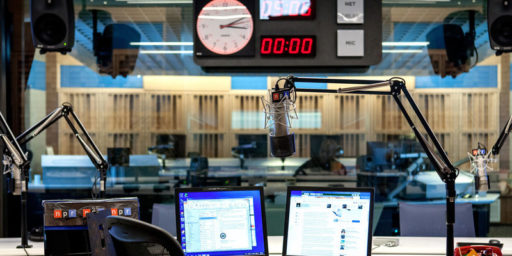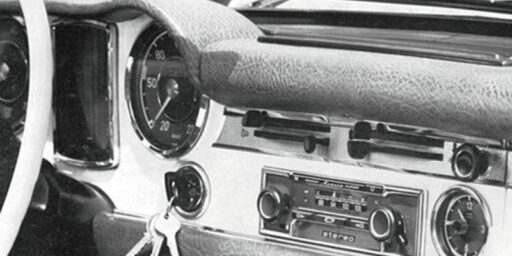NPR Downsizing to Survive
A significant cut to staff and programming to stay afloat.

NPR (“NPR cancels 4 podcasts amid major layoffs“):
NPR moved this week to cut 10 percent of its staff and stop production of a trio of acclaimed seasonal podcasts — Invisibilia, Louder Than a Riot and Rough Translation — as it seeks to close a yawning budget gap that stands in excess of $30 million.
The network also canceled a comedy podcast unveiled just a year ago called Everyone & Their Mom, a spinoff of the mainstay radio program Wait Wait Don’t Tell Me.
“We literally are fighting to secure the future of NPR at this very moment by restructuring our cost structure. It’s that important,” NPR chief executive John Lansing said in an interview. “It’s existential.”
Lansing said the network sought to protect its core public service mission of journalism while preserving what he calls its “North Star.” Since joining NPR four years ago, Lansing has pushed to ensure the network has a bigger and broader audience base, rooted in younger and more diverse listeners, readers and consumers who will serve as the next generation of NPR supporters.
A number of long-time NPR staffers have chosen to leave. Some familiar voices are among them, including Senior European Correspondent Sylvia Poggioli, who has been with NPR for 41 years. The network has not made any specific announcements, however, choosing instead to let those departing decide how to share the news.
The layoffs also affect people who work behind the scenes to produce the shows and podcasts, design visual elements for the web, conduct audience research, and do the myriad other functions required of a major news network. National Public Media, NPR’s ad-services arm owned jointly with PBS and WGBH in Boston, is not included in this round of layoffs because it went through its own downsizing earlier this year, Lansing said.
Lansing said that executives moved quickly as the scope of the problems became more evident — NPR in November froze most vacant positions and sharply reduced travel — so a full strategic overhaul was not possible. But the network is unifying its newsroom and programming division, which makes most of NPR’s podcasts. Lansing said the current separation artificially cleaved NPR’s journalism and editorial creations.
In the grand scheme of the US federal budget, $30 million isn’t even a rounding error, much less a “yawning gap.” But, despite being created (along with PBS) by an act of Congress more than half a century ago, it’s organized as a non-profit and is expected to be mostly self-sustaining, relying on licensing fees for its programming, corporate sponsorships, pledge drives, and the like to stay in business. It gets essentially no money from the Corporation for Public Broadcasting.
While I became a fairly regular NPR listener more than three decades ago, when I was in graduate school, I was long skeptical of the need for government subsidy. After all, the free market was providing a near-infinite supply of news content, increasingly free to anyone with an Internet connection and included the deal for anyone with a cable or satellite subscription. The steady race to the bottom in the news industry, with all but a handful of brands prioritizing clicks over quality, ultimately changed my mind on that front.
At the same time, the nature of these layoffs demonstrates that NPR has, to some degree, lost its “North Star.” While I find shows like Wait Wait Don’t Tell Me and the old Car Talk entertaining, it’s not obvious why they need to be on public radio. The canceled podcasts seem, similarly, to be things that other outlets can do. The podcast space is incredibly crowded as it is.
There’s a need for high-quality journalism that isn’t under pressure to fan the flames of outrage or otherwise jump on stories that have natural viewer appeal. Shows like Morning Edition, All Things Considered, or the NPR Politics Podcast are worth saving. Alas, they’re widely assailed from the right as “hopelessly biased,” leading to constant calls to strip their meager public subsidy.






One thing I wonder about this is whether the 10% means 10% of people working for the just NPR national organization, or 10% of people across all of the member stations. Most of NPR’s programming isn’t produced by NPR, but by individual member stations, so if it’s just the national organization downsizing, this probably isn’t as big a story as it first appears.
I know our local station is currently expanding, which makes me suspect this is just the national organization.
January 2023 media bias chart has them as solidly centrist: https://i.redd.it/daotnujkmica1.jpg
NPR’s cheese was moved and they stayed far too long with the old format, add to that, streaming has demolished audiences for radio.
When I had a ~half hour commute, I was a regular listener and contributor, but when I began working from home or had a 10 minute commute, not so much. Today, I can’t remember the last time I listened to any public radio programming, except for occasionally to a Boston based micro-niche station. I suspect that I’m not alone in a change of habits.
Anything that is not expressly and unambiguously hard right is widely assailed from the right as “hopelessly biased,”.
Contemporary conservatives are not interested in “balance”. Yet the hardy right gets to cocoon in their own little wack-o-sphere. That is the asymmetry baked into the the current discourse.
I was a huge fan and supporter of NPR for decades, donating thousands over the years in pledge drives.
But I haven’t listened to or financially supported NPR for probably six years at this point. Part of that was getting a remote job after leaving government service, so no more commuting and part of it was the quality of their journalism went down as they switch to POV-style reporting and, like a lot of media companies, they increasingly focused on coverage tailored to specific demographics, especially wealthy white progressives.
I listen to NPR daily, usually All Things Considered, and I listen pretty much all day on Saturday while I bake/clean/do chores. Wait, Wait, This American Life, The Moth–I love all of these programs and would very much miss them if they went away. We are sustaining members of both NPR and the local PBS station.
I find their reporting to be some of the best out there, and I prefer the PBS Newshour BY FAR over ANY cable news, which is more “infotainment” than any real news.
Big changes in the workplace have been coming at us for quite a while, and with the Covid-shutdown they arrived with a vengeance. The shake out in workplace economics is happening rapidly right now, and it’s going to continue for years.
A few years ago, at the organization I worked for we realized that on a regular basis about half the staff was was not present – they were either WFH, at meetings/conferences, etc. Basically, we were leasing expnsive office space that was by most measures consistently underutilized – we wre paying for space we did not use. We moved, leased about 1/3rd the space we were previously utilizing and saved a significant aount of money.
@Stormy Dragon:
I don’t know how NPR is structured, but most nonprofits with a national-state affiliate structure (ACLU, Planned Parenthood, most of the big environmental orgs, etc) have little or no control over affiliate staffing or budget. They are separate entities that share resources and align on direction. I think a lot of member stations are owned by universities or operate independently, but I’m not entirely sure.
@Neil Hudelson:
My local PBS radio station is “a service of” ASU (Arizona State University).
@Neil Hudelson:
WERN in Madison is owned by the state of Wisconsin (which is something I didn’t know until now)
@Neil Hudelson:
Our local station (WHYY) actually predates NPR by almost 20 years and was originally founded as a charitable activity by Westinghouse Broadcasting. It was one of the original founding stations when NPR did start and currently also owns the five former New Jersey Public Broadcasting radio stations.
It also produces Fresh Air (which kind of goes back to my point that most of NPR’s programming isn’t actually produced by NPR, so I’m not sure this downsizing actually impacts content much)
I find it deliciously ironic that the rise of the NPR juggernaut was a direct and inevitable outcome of the attacks on public radio by the right wing starting in the 1980’s. At that time there were a lot of stations playing classical, jazz and even bluegrass music round the clock, staffed by dedicated and enthusiastic semi-volunteers. They relied on pledges to survive, but despite that a good portion of their budget came via various government grants that supported the arts. When NPR’s All Things Considered started taking an hour a day from the core programming, a lot of people were upset, but it didn’t take long to realize that the vast bulk of money raised during their pledge drives came in during that hour. And since the government funds were often matching grants, those funds supported the other 23 hours of programming. But as Republicans grew to hate NPR and fought to crush them, they ended up kicking the legs out from all those classical music shows. The stations were forced to become self sustaining and that meant more NPR, more news, more talk.
@MarkedMan: I have fond memories of changing the radio station every time Jonathan Schwartz’s show would start.
With his long, slow voice and his encyclopedic knowledge of jazz history and anecdotes that centered around the most mundane facts he somehow dominated the airwaves in NY.
“… and on that harmonica was engraved a picture of a duck, and so it seems fitting that our next song features a young Charlie Parker, no not the one you’re thinking of, this is Charlie Dean Parker who later went on to fame as the Maytag Repair Man in the commercials in the 1970s, but on this record you can hear him tapping his feet slightly out of rhythm as he plays French horn. The French horn was an invention of Hugo French, who also made French’s mustard, which is funny because mustard is yellow just like a duck’s bill…”
I think he must have been funded by an organization that was dedicated to making people hate jazz.
@MarkedMan:..they ended up kicking the legs out from all those classical music shows.
In 1969 WSIU-FM (owned by the Board of Trustees, Southern Illinois University) was pretty much in the grips of the Classical Music clique on campus. There were some pre NPR local news programs but the balance of air time was dedicated to the highbrow coterie.
One of my college roommates went to the studios on campus toting some Jazz albums and tried to get them to devote just an hour a week to say Miles Davis or John Coltrane. He was told that there was no audience for it. At a college campus in the ’60s!!!
What that meant was that the donors to the station wouldn’t have it.
There have actually been threatening letters in the campus newspaper from contributors who would withhold their money as more and more time was scheduled for NPR news programs and less for Bach and Beethoven.
It took many years for this to change. The current daily schedule notes a few hours on the weekend devoted to Jazz, Blues and other tunes.
Since this week is the Fall fundraising I have been constantly reminded that WSIU-FM gets most of it’s money from listeners. Fortunately today is the last day of the solicitations.
I use an app called Radio Garden (I think it was mentioned on here about a year ago) and, except for some international stations, my favorites list is nothing but public radio stations. They range from the usual news and music stations to old time radio plays and comedy shows to a goth/cryptid/alien themed station out of Dayton, Ohio (96.6 Sundown The Wolf for any interested). Public radio, much like public television, is one of the best things about the US. I worked in a commercial radio station while in high school in the 90’s as a producer and air talent and saw the beginnings of the consolidation of commercial radio. The garbage that commercial radio has become due to companies like iHeart Radio has turned off so many to what is actually out there and quality programming. As an aside, as a somewhat ex-smoker (went from a pack and a half or so a day to one to 5 smokes a week thanks to nicotine salt pouches), the old cigarette commercials on some of the old time radio shows were insidious and sometimes trigger a craving. Especially the Lucky Strike commercials on the old Jack Benny show.
@Gustopher: I thought Jesse White was the Maytag Repair Man in the 70s commercials. 😉
@Thomm:It was interesting to see that Margie and her dad on My Little Margie both started smoking on screen when Philip Morris started sponsoring the show, but it was enough for Gillis’ Grocery to display cigarettes at the cash register on Dobie Gillis.
@just nutha: Honestly, when watching old Dobie Gillis episodes, I just saw that as a figment of the times…never considered sponsorship was a factor. Though that is why TV shows from the 50’s to the 70’s tended to have one make of cars used in shows. Like Chryslers and The Beverly Hillbillies or the custom made Plymouth convertible, since there was no convertible version for that model in that particular year, for Mike Brady in The Brady Bunch
@Thomm:..Especially the Lucky Strike commercials on the old Jack Benny show.
I remember getting all excited when I saw the dancing Old Gold cigarette packs on TV when I was a young lad. Must be why I choked on the goddamn butts for 35 years.
@Mister Bluster: actually a few weeks ago, I looked up the old Jack Benny Looney tunes episodes to see if they existed anywhere. The phrase, “so round, so firm, so fully packed” triggered memories of them. I think that phrase also wound up in some other Looney tunes features in referring to a buxom female character.
@Thomm: Referring to women, the phrase may have started with a Merle Travis song with the lyric “so round… packed, that’s my gal.”
@just nutha: Maybe…never really listened to much merle haggard. I don’t know for certain if it was used in other Looney tunes or not either, but it is used verbatim in the old Lucky Strike ads starting in the mid 40’s.
@Thomm:..so round, so firm, so fully packed…
I’ve got a hat just like the one Eddie Valiant has on in this scene. But if I gotta’ wear a tie, I’ll just have to do without.
@Thomm: The information the innertubes gave me is that the LS ad is from 1943 and the Merle Travis (no relation to Haggard) was written in ’47. The tubes offered me a link to the phrase with Looney Toons as an autofill, so I’m guessing that would work too, but I didn’t look.
@Just nutha ignint cracker: Neat. Thanks. Now I’m wondering if one influenced the other…guess I will never know for certain. My brain must have autofilled, “Haggard” when I initially read your comment.
@Just nutha ignint cracker: so I did some digging, and it looks like it was referenced in Tom and Jerry, pepe le pew, and the little jayhawk Looney tunes cartoons verbatim. My brain was trying to dig up deep memories of the Tom and Jerry version since the voice is close to what I was recalling. Must have had a deep cultural significance for a time.
Not sure what the salaries of the top talent is today but I’m sure is north of the days when Cookie Roberts and company were drawing 400k a year, if I recall correct. If so, that would be a good place to start cutting, they were so overcompensated as to be ridiculous; they certainly were not serving the public interest.